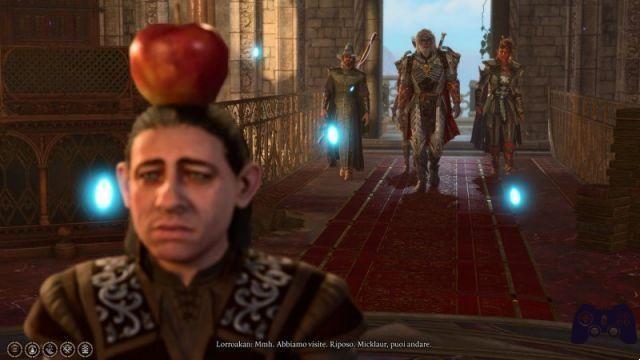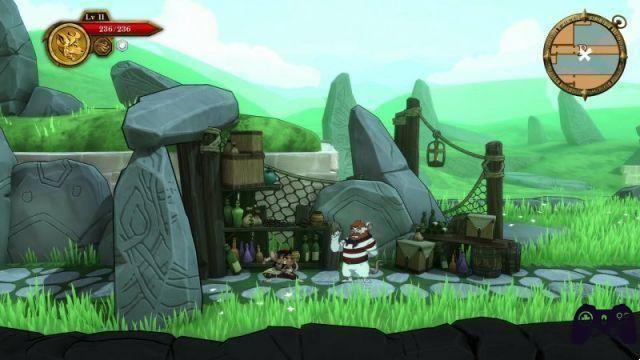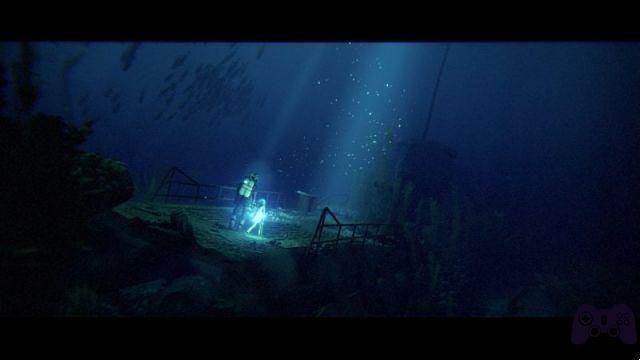Despite his stature and austere appearance, swen vincke It is anything but inaccessible. Consider that a few years ago, on the occasion of an event dedicated to the console version of Divinity Original Sin 2, the founder of Larian Studios decided to avoid the usual cold presentation in a hotel and invite the press directly to his house for a barbecue. . At his house in Ghent, the Belgian city where the development team is based, we even found ourselves talking to him about football; It was World Cup year, after all, and we enjoyed making fun of the Azzurri's less-than-stellar performance (and then enjoying it, given that Belgium would be eliminated soon after).

It's rare for such an influential figure to be so open to chat, but it's well known that Vincke is nothing short of out of the ordinary: in fact, he's the man whose software house almost suddenly brought classic RPGs back to the market. The fashion was changing and, although the discussions about the football misfortunes of this or that country were hilarious, we immediately moved the conversation to video games, to better understand how a team on the verge of bankruptcy until recently had managed to produce two pearls like the Divinity. Original Sin, not caring much about the rumors that old style RPGs on the market were dead. The answer? Simple, no one was developing them, Swen and his team wanted to play similar titles, so they just said "we could make one ourselves." After all, they couldn't be the only ones wanting similar experiences on the planet.
They were right. From that elemental and visceral desire was born something much more elaborate and surprising than a simple return to the past: a kind of chain reaction, which saw Divinity at the reins of a true renaissance of the Western role-playing game. In fact, Larian had not limited himself to following the paths laid out by the great classics of the past: he had dared to challenge consolidated conventions and overcome many of the barriers posed by the pillars of the genre. The two Original Sins, with their gameplay, provided players with complex tools, to the point that several users perceived them as "breakable", when in reality they were nothing more than games capable of largely capturing the ordered chaos of adventures. in constant evolution. around the table with a teacher (well... at least excluding some technical issues that really ruined things). The good thing is that Swen and his team achieved all this by circumventing the often unstable currents of the market and speaking directly to the enthusiastic public through Kickstarter.
It is not often that we see so many factors align so beautifully, however, the experience gained in those years of effort today converges in Baldur's Gate 3 (initially known as Project Gustav, after the name of Swen's dog): an RPG with an illustrious license, in the hands of people who have dedicated themselves body and soul to the study of those works that made their name great. What we analyze today, therefore, is a work that carries on its shoulders the future of an entire genre, which has grown hand in hand with its community thanks to a long early access, and which has managed in recent days to demonstrate once more how much In video games there is room for depth and atypical approaches. To properly evaluate it, we've tackled it virtually non-stop since its launch, trying to analyze every detail and better understand its tangled web of events. And on that couch, talking about football and development, we already had the perception of being in front of a team made up of incredible talents, but what we had in front of us managed to exceed all of our wildest expectations. Get ready, because Baldur's Gate 3 raises the bar for role-playing games to levels that border on madness, and we assure you that today has not been a review easy.
Fiction: There is a bard in all of us.

We believe that it is good and correct to start from fiction from Baldur's Gate 3, because it is generally the most criticized element of the two Divinity Original Sin. It's not that those games were going to be discarded from this point of view, on the contrary, especially in the second chapter there was no shortage of high-quality personal stories and interesting ideas; In the opinion of some, however, the fantasy world invented by Larian lacked a solid enough foundation to support great stories, as well as originality.
With Baldur's Gate 3 this fundamental problem does not arise: in fact, the game is set in forgotten kingdoms, among the most well-known and beloved Dungeons & Dragons universes. And hey, it may not be the most eccentric and tempting world available, but it's certainly a big step forward compared to Divinity's Rivellon, which allowed the Larian writers to demonstrate its qualities once and for all.
Now, if you are expecting a narratively satisfying experience on the level of a Planescape Torment or a Disco Elysium, it is worth making some clarifications, given that in Baldur's Gate 3 the focus of the plot is completely different. These are titles based almost entirely on the quality of their writing, whose intersections are multiple, but in general well defined and limited in possible developments; In Larian's work, however, The story is expertly combined with every aspect of the game., because the developers' desire has clearly always been to offer the user a game capable of translating the chaotic and unpredictable experience of Dungeons & Dragons from pen and paper to digital. But be careful, we do not intend to belittle what has been done, because if from the point of view of the "plot" in its purest form Baldur's Gate 3 does not manage to reach certain heights, from the point of view of the management of the variables and the given power the player reaches peaks that are absolutely unattainable for any other game belonging to the same category.

The number of ways to tackle the game's titanic adventure is staggering, and that's really the only adequate definition. Larian has created a gigantic network of missions and events divided into three different acts, so cleverly interconnected that it allows you to experience several different campaigns with a handful of decisions made at the right (or wrong) time. Seriously, "player agency" - the player's ability to influence the game world - reaches levels here never seen before: decisions made in the first act can greatly modify entire missions structured on multiple levels, in the third act , each of your companions has dedicated quests that evolve in countless ways, and the number of possibilities and changes you have to deal with before the end is overwhelming, to say the least. The most incredible? This mass of events and dialogue progresses naturally regardless of what you choose to do, whether measured calculations or gross errors, it makes no difference. Baldur's Gate 3 is a unique title from a narrative point of view precisely for this reason: it is the closest thing there is to "real" D&D, and it constantly surprises the player by reacting intelligently to almost any approach. How did the developers achieve something like this, especially considering that the campaign easily lasts more than a hundred hoursWe don't know, but it must have been a titanic job to say the least.

But be careful with that "almost"; No matter how exceptional what has been done, it is not perfect and, in fact, in the sea of conversations and circumstances some inconsistencies can occur. They're usually minor and pretty rare, like drops in character relationships due to unnatural replications (happened to us only a couple of times), or weird interactions that partially ruin quests, but it's really hard on the progress of the entire campaign. freezes completely, and we still find it fantastic that a game like this is so well calculated in its countless options, to the point of making the experience very pleasant even for those who decide to face it without ever reloading and accept the evolution of their actions regardless of strokes of bad luck.
For the record, the qualities are not just those described above: lovers of the old Baldur's Gate will surely have something to eat in this third chapter, since the developers at Larian are clearly big fans of the series and did not go easy on the service of fans. In addition to creating your own alter ego from scratch, in the game it is also possible to start with predefined characters, playing one of the companions or starting from a specific customizable point called "Dark Pulse", which is, in our opinion, the most fascinating for everyone (especially for those who played the predecessors). Just a warning: this is an extremely mature game, which does not take itself lightly when it comes to talking about violence or sex. In fact, especially regarding the second theme, it may even be "too close" to the real Dungeons & Dragons. You will practically be inundated with advances during the adventure, so if when you play at the table with friends you love playing a bard eager to get into the bed of any creature in the kingdom, you will have a lot of fun. In our opinion, perhaps the writers could have been a little calmer with the "hot" scenes, because sometimes the companions' tendency to tear each other's clothes becomes almost comical, but it's certainly not enough to diminish the rest of this thing. good. .
Structure: There is a chest in front of you, what do you do?

Obviously such narrative management would not be possible if there were no support for it. a structure and a game system equipped with the necessary depth. Luckily Larian is a master in this field, and with Baldur's Gate 3 she has far surpassed what she did with her previous titles, despite the need to respect (at least in part) the fifth edition of Dungeons and Dragons. In fact, the game is based on the notions of the work of Wizards of the Coast, and faithfully follows a good part of its rules, but at the same time - to guarantee a higher level of interactivity than that of Original Sin - it not only requires No It is part of the elemental system of the Belgian house's past works, but it dares to expand the already notable range of basic actions available to the player. This, unsurprisingly, allows you to do some pretty absurd things compared to most modern video games: deactivate traps by throwing objects or spells at switches, create towers of boxes to scale a building, completely avoid entire puzzles by short-circuiting mechanisms. with some water and a well-placed lightning bolt, use an enemy's defenseless body as a weapon, abuse one of the countless movement options to gain all sorts of advantages, and much more... very little is off-limits to you in this Baldur's Gate, and such layering has allowed the developers to shape missions of rare quality, designed precisely to stimulate the player's creativity.

We were not kidding when we pointed out that the narrative is closely linked to the gaming experience, considering that any strategy, no matter how absurd, is usually taken into account. Virtually all puzzles can be completely or partially avoided just with the right spell at the right time, a series of conversations full of difficult dice rolls or troublesome battles can become a walk in the park with the right preparation or some clever expedient, and it is often only possible to get out of seemingly insurmountable situations by changing tactics and making better use of the numerous powers placed at the disposal of the various classes. Seeing such a level of design in an RPG of this type warms the heart, and while it's not always "flawless" (accidents happen when you experiment a little too much), it makes every act more fun than ever for those who love it. loves taking risks and getting to the bottom of systems.
And the best thing is that Larian has not even sacrificed the spectacular nature of the adventure to accommodate this network of missions and battles. Unlike Original Sin 2, which showed its side in the last act, Baldur's Gate 3 is a continuous crescendo, in which each act is better than the last, and there is no shortage of epic moments, whether through excellent cutscenes or spectacular boss battles of uncommon brutality, always expertly inserted into the climactic moments of each mission.
The only real flaw here is the way it was designed. the interface. A titanic work like this has an absurd amount of objects to say the least, and inventory management is neither the most intuitive nor the most brilliant. The developers also tried to improve things, including an item search bar, several ways to reorder each tool obtained, and even bags and satchels of all sizes for those who want to split certain items, but overall more could be done to make the task easier. easier for the player, or to automate the management of some tools.
Gameplay: The Player's Handbook

Things get complicated when you get into class management and game during battles. As we said, Baldur's Gate 3 relies heavily on turn-based game system of Dungeons & Dragons, and more precisely in the fifth edition; There are so many elements in common that, to create powerful characters, it is enough to have a good knowledge of that regulation, and apply approximately the same bases and optimizations of the abilities that would be applied in the version to the progression of the alter. The ego and its companions, paper and pen.
There's just one small problem: D&D is not even remotely a well-balanced game, to the point that the forced intervention of the dungeon master usually has to rebalance the situation a bit. Master that, in Baldur's Gate 3, is completely absent, the very few limits of the system being the only (fragile) barrier to stop those players particularly skilled in the art of "powerplay". The Larian developers, for their part, They also changed the different classes and skills a bit., but instead of weakening them, they opted for the more fun solution, even going so far as to strengthen some of the less represented ones (like the monk, here significantly stronger than his paper counterpart). The gods then think about amplifying these excesses even more. extra powers linked to the illithid tadpoles, disgustingly useful in battle (but not without consequences), and a very long list of magic items equipped with passive effects more powerful than we expected, whose synergies make the builds even more devastating. Think about it, it's even possible. reset class of all characters freely with a handful of gold coins, in case you are not satisfied with the choices made. In short, as you can well imagine, anyone who knows how to properly manage progression, upgrades, potions and the many additional tricks that the game offers to deal damage will be able to overcome any battle effortlessly.

However, even considering these bases that are almost impossible to regulate, the conditional remains mandatory. After all, Larian is known for the not exactly accessible difficulty of her games and, once again, she has decided to "balance" everything calibrating the battles upward. Already on normal difficulty, the first act will kick your butt, especially considering that the enemies scale with the area and not with your level, after which, starting from the second act, wild battles await you, full of enemies, whose level of challenge awaits you. remains high due to the developers' decision to limit the Maximum player level at 12. It's a shame you can't go further, but at least Baldur's Gate 3 isn't too easy for more experienced players, and we assure you that the skills at your disposal will be more than enough to give you adequate combat satisfaction. Oh, if you're intimidated by that, don't fear: there are three selectable difficulties in the game, one designed to enjoy the narrative without worrying too much about the confrontations, the normal one we just described, and a "strategic" difficulty. for those who really want to push themselves to the limit. The latter makes enemies noticeably more aggressive, resilient and dangerous, and will force you to make the most of all your abilities. For heaven's sake, we hope minmaxing nuts will snap it like a twig in a few weeks, but it's a good thing there are several very well-finished alternatives to choose from even in this regard.
Technical section: chipped nut

While we're talking about enemy aggression, it's time to also talk a little aboutAI, because the adversary behavior routines inserted by Larian in Baldur's Gate 3 are among the most elaborate and nefarious we've ever seen, and among the most obtuse. Better to clarify: the game's enemies, whenever it's their turn, adapt their attacks taking into account a large amount of data, including the position of the player characters on the map and the possibility of exploiting certain interactive elements to their advantage. . This means that if you position yourself poorly (especially in strategy mode), you may see the AI use some very "human" strategies against you, such as eliminating one of your fighters with a push into a bottomless pit, tendency to immediately. attacking characters with less defense and more offensive potential, or the blatant use of control powers that are incredibly annoying to deal with. The calculations are so complex, however, that it can happen that the enemy "freezes" for a few seconds (there is an internal timer that prevents battles from freezing due to these problems beyond a certain time), without being able to understand what it is. The best way to go to get to the player quickly or how to best prepare for some of his moves. So, in a nutshell, the enemy is extraordinarily dangerous on maps with a relatively simple structure, but tends to stall or make mistakes on battlefields with more verticality, especially if the player abuses abilities like teleporting or flying. Be careful, it doesn't always happen, to the point that we have repeatedly had to face very fierce and brilliant threats even in multi-level maps, especially when these in turn have very flexible movement abilities; However, adapting to certain areas of the AI was an issue also present in Divinity Original Sin, and it would have been nice to see it go away completely.

However, it is difficult to criticize it. overall graphic quality, since the evolution of Vincke's team was transcendental in this aspect as well. Baldur's Gate 3 is a top-down RPG, but the level of detail is very respectable even when the camera zooms in "dangerously" close, starting with the overall quality of the textures and models in character creation. The maps are packed with well-modeled elements, and the city of Baldur's Gate in particular looked like a real splendor, especially considering its size. Even the optimization work is very respectable: with a medium-high configuration it is possible to run everything at maximum with very few problems (our good PC equipped with a 3070 had who knows what difficulties), and the engine is scalable to the point of offering a more than worthy experience even on significantly lower performance settings, including the Steam Deck.
However, having put everything in black and white, we must remember one very important thing: Baldur's Gate 3 is always and in any case a Larian game and, as talented as it is, this Belgian software house is not known for cleanliness Of his works. We're way over Divinity's stability at launch, let's be clear, however, the new Baldur's Gate is also riddled with a good number of errors, often harmless, other times much less so. Only in a couple of cases do we find technical problems or glitches waiting for us that could block our progression, forcing us to reload, but what about minor errors? Much more frequent, especially in the third act (understandable given its enormous complexity). Therefore, during your raids, you may see unclear deaths of this or that character, missions that do not update despite passing the act and not completing them, indicators that disappear from the map, incorrect interactions between objects, etc. So.

It's a pretty classic mix of stumbles, and honestly, we expected much more serious stylistic flaws in a gigantic RPG like this; In general, although evident, the technical problems never really ruined our experience, beyond some swearing at particularly "hot" moments. Larian, furthermore, clearly continues to support his creature with weekly patches, which each time fix dozens of small deficiencies. It's hard to say if they'll ever get it completely cleaned up, but it's certainly a good sign of intention.
En a cooperativeUnfortunately, it was difficult to draw very deep conclusions. We tried it without too much difficulty and it is an exciting experience with friends, precisely because of its proximity to the madness of tabletop Dungeons & Dragons; However, we've also heard that when playing online, technical issues tend to multiply, and it's worth keeping this in mind if you want to play in a group for long sessions. It's a shame about the lack of a "master mode" here: considering how exceptional the D&D transposition Baldur's Gate 3 manages to be, it would have been a memorable extra, to say the least; In any case, it's understandable that the developers couldn't include it for release, and that doesn't mean it won't arrive in the future.
Finally, everything is excellent. music and audio. The English dubbing is of the highest quality (and there is talk of an exaggerated number of dialogues) and the soundtrack positively surprised us at times, demonstrating an evolution of the team even in this last component. less good there Spanish localization, which has several bugs here and there, but at least it is present at launch and will in turn be improved in future patches. It's almost a shame; If you count how poorly translated the Spanish manuals of the fifth edition of Dungeons & Dragons are, it is in some ways more faithful although imperfect.
Conclusions
Holygamerz.com 9.5 Readers (209) 9.2 your voteBaldur's Gate 3 is an extraordinary role-playing game and represents the definitive consecration of Larian as the "new" great cornerstone of the genre. This is an amazing digital transposition of Dungeons & Dragons, capable of transmitting emotions and offering possibilities that we believed we could only find in the best games around the table in the company of a master. The fact that a video game can offer a similar experience today guarantees it an impact comparable to that of its direct predecessors, and we are sincerely convinced that, as the years go by, it will be remembered with the same love and reverence as great works. of the time: Black Isle Studios and the old Bioware. It's a heavy medal to wear on your chest, and the only reason we don't give it our highest possible rating is that it still has room for improvement, due both to some small but obvious internal deficiencies and the inevitable errors. It remains an absolutely must-play masterpiece if you love deep, passionately developed titles, and a must-play for anyone who loves RPGs.
PRO
- Huge, replayable, incredibly complex and with extraordinary mission design.
- Beautifully integrated narrative into the game, engaging the focus of almost every player.
- Exciting battles calibrated upwards (on the highest difficulties), which give great satisfaction.
- Elaborate mechanics, offering endless possibilities and options.
- Technically notable
AGAINST
- Lots of minor errors (and some major ones), especially in the third act.
- Some choices in the narrative do not shine brightly
- Unsurprisingly, breaking a D&D system warp is not difficult for an expert.






